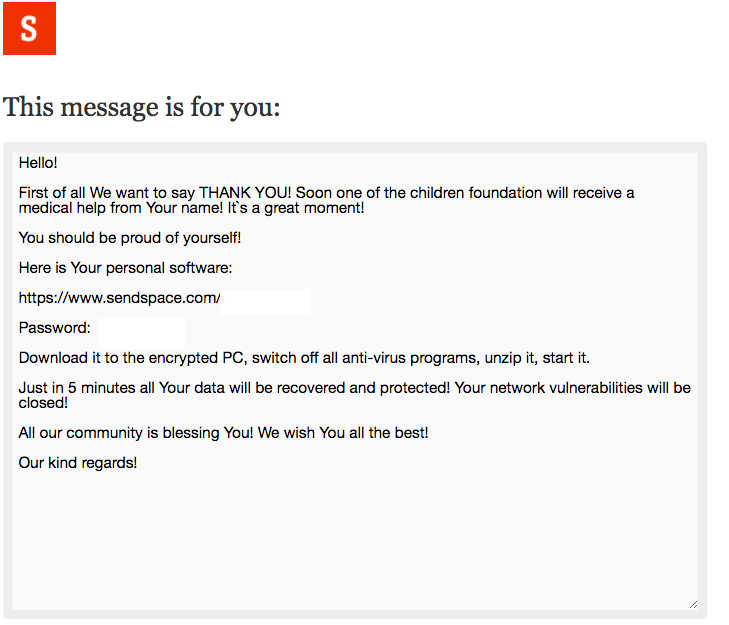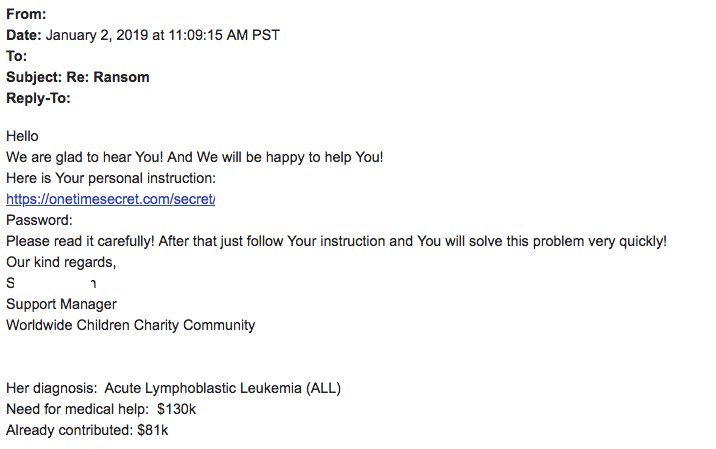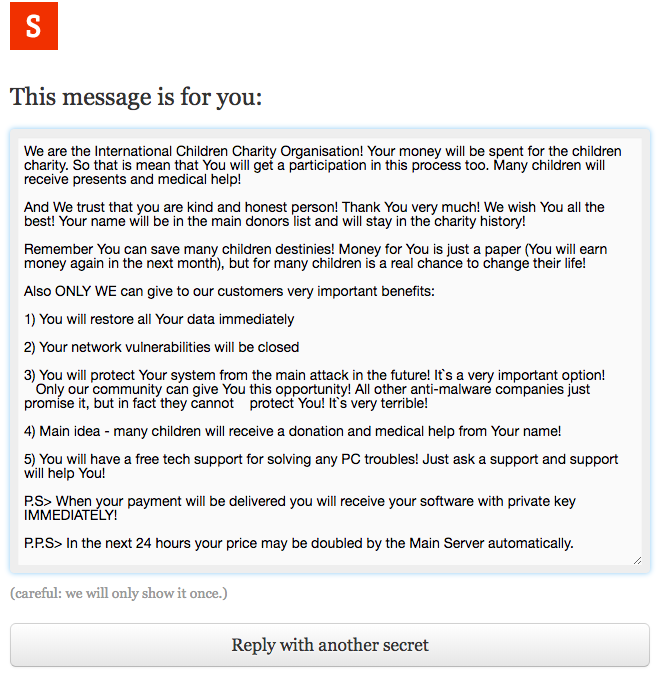Ransomware that uses a fake children's charity for phishing
CryptoMix uses information lifted from children's charities to coerce victims into ransom payments


A new strain of ransomware has surfaced that pretends to be working for the good of a children's charity rather than for criminal gain, in an attempt to make handing over cash more palatable for a victim.
The newly discovered CryptoMix has been found masquerading as a Robin Hood-style of ransomware, providing links to a fictitious charity and an offer to put their name with their donation.
First spotted by cyber security firm Covewave, the ransom notes go so far as to include the names, diagnosis, and even pictures of young children that the ransom payments claim to support which, according to Covewave, the information appears to have been lifted from crowdfunding websites.
"In recent cases, Coveware observed ransom notes and communications that referenced a fictitious charity but real children," the company said. "The ransom communications begin with a .txt file that provides email addresses that the victim may use to contact the ransomware distributor."
Covewave have an example of the email exchange hackers use with this scheme. In the correspondence, they claim to work for a fictitious charity and give a description of a child's diagnosis and the funding amount being raised.

Email of a hacker using CryptoMix - courtesy of Covewave
Disturbingly, the email contained an image of what Croewave said appeared to be a 3-year-old girl lifted off a crowdfunding site.
Get the ITPro daily newsletter
Sign up today and you will receive a free copy of our Future Focus 2025 report - the leading guidance on AI, cybersecurity and other IT challenges as per 700+ senior executives
From there, the hacker will direct the victim to view payment information with instructions on a temporary page. This page includes bitcoin wallet payment instructions and more detail on the fake charity.
"We are guessing this tactic is meant to assuage the moral hazard associated with paying a ransom," Covewave explained. "It goes without saying that these cyber criminals did think this through. It is poignantly obvious that the charity is fake, and that the details of the child's case are lifted from other sites."
After paying the ransom, a victim is given more detail about the charity as well as a message suggesting their own name will be used alongside their donation.

CryptoMix has also been identified by Avast as a particularly nasty type of ransomware that can ultimately leaves your files locked even if you pay the ransom.
This strain of ransomware was first spotted in March 2016. The spread of this ransomware could be described as a medium level of prevalence and uses exploit kits as its main delivery method.
"Once CryptoMix infects a machine, it tries to communicate with its command and control server to establish a key to encrypt files. However, if the server is not available or if there is a connection issue, such as a blocked communication by a firewall, the ransomware will encrypt files with one of its fixed keys, or 'offline key'," it said.
Bobby Hellard is ITPro's Reviews Editor and has worked on CloudPro and ChannelPro since 2018. In his time at ITPro, Bobby has covered stories for all the major technology companies, such as Apple, Microsoft, Amazon and Facebook, and regularly attends industry-leading events such as AWS Re:Invent and Google Cloud Next.
Bobby mainly covers hardware reviews, but you will also recognize him as the face of many of our video reviews of laptops and smartphones.
-
 Cleo attack victim list grows as Hertz confirms customer data stolen
Cleo attack victim list grows as Hertz confirms customer data stolenNews Hertz has confirmed it suffered a data breach as a result of the Cleo zero-day vulnerability in late 2024, with the car rental giant warning that customer data was stolen.
By Ross Kelly
-
 Lateral moves in tech: Why leaders should support employee mobility
Lateral moves in tech: Why leaders should support employee mobilityIn-depth Encouraging staff to switch roles can have long-term benefits for skills in the tech sector
By Keri Allan
-
 Cleo attack victim list grows as Hertz confirms customer data stolen – and security experts say it won't be the last
Cleo attack victim list grows as Hertz confirms customer data stolen – and security experts say it won't be the lastNews Hertz has confirmed it suffered a data breach as a result of the Cleo zero-day vulnerability in late 2024, with the car rental giant warning that customer data was stolen.
By Ross Kelly
-
 ‘Phishing kits are a force multiplier': Cheap cyber crime kits can be bought on the dark web for less than $25 – and experts warn it’s lowering the barrier of entry for amateur hackers
‘Phishing kits are a force multiplier': Cheap cyber crime kits can be bought on the dark web for less than $25 – and experts warn it’s lowering the barrier of entry for amateur hackersNews Research from NordVPN shows phishing kits are now widely available on the dark web and via messaging apps like Telegram, and are often selling for less than $25.
By Emma Woollacott
-
 Healthcare systems are rife with exploits — and ransomware gangs have noticed
Healthcare systems are rife with exploits — and ransomware gangs have noticedNews Nearly nine-in-ten healthcare organizations have medical devices that are vulnerable to exploits, and ransomware groups are taking notice.
By Nicole Kobie
-
 Alleged LockBit developer extradited to the US
Alleged LockBit developer extradited to the USNews A Russian-Israeli man has been extradited to the US amid accusations of being a key LockBit ransomware developer.
By Emma Woollacott
-
 February was the worst month on record for ransomware attacks – and one threat group had a field day
February was the worst month on record for ransomware attacks – and one threat group had a field dayNews February 2025 was the worst month on record for the number of ransomware attacks, according to new research from Bitdefender.
By Emma Woollacott
-
 CISA issues warning over Medusa ransomware after 300 victims from critical sectors impacted
CISA issues warning over Medusa ransomware after 300 victims from critical sectors impactedNews The Medusa ransomware as a Service operation compromised twice as many organizations at the start of 2025 compared to 2024
By Solomon Klappholz
-
 Warning issued over prolific 'Ghost' ransomware group
Warning issued over prolific 'Ghost' ransomware groupNews The Ghost ransomware group is known to act fast and exploit vulnerabilities in public-facing appliances
By Solomon Klappholz
-
 The Zservers takedown is another big win for law enforcement
The Zservers takedown is another big win for law enforcementNews LockBit has been dealt another blow by law enforcement after Dutch police took 127 of its servers offline
By Solomon Klappholz